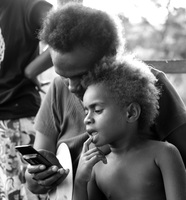The PiPP report, “Social and economic impact of introducing telecommunications throughout Vanuatu”, offers numerous examples of the inordinate lengths that rural merchants go to just to keep stock on their shelves, putting paid (one hopes) to the stereotype of the indolent islander waiting patiently for the cargo to come. If it serves no other purpose, it is invaluable for this insight alone.
But there is a great deal more to it than that. The image it conjures up is not so much of new entrants to the Global Village as of residents of Digital Islands: While communication has improved –and social and economic well-being along with it– the distance from one island to the next has diminished only slightly.
Mobile telephony in and of itself is a boon in most regards, but without complementary infrastructure and services, it is of limited value.
 Electronic media have been with us for a couple of lifetimes now, and many of the lessons that once seemed revolutionary, even world-changing, have been reduced to mundane platitudes. Here in Vanuatu, however, we would do well to relearn them. A new report from the Pacific Institute of Public Policy gives us that opportunity.
Electronic media have been with us for a couple of lifetimes now, and many of the lessons that once seemed revolutionary, even world-changing, have been reduced to mundane platitudes. Here in Vanuatu, however, we would do well to relearn them. A new report from the Pacific Institute of Public Policy gives us that opportunity.
Marshall McLuhan’s rise to prominence as a cultural icon parallels that of television. Today, just like television, he is as widely lionised as he is misunderstood. Like credulous children, we toss around the terms he minted without a moment’s reflection. ‘The media’ has become a shibboleth for corporate commentary on the events of the day, filtered arbitrarily through a lens that sees no further than the next ratings cycle.
McLuhan saw this trend and feared it. Contrary to popular belief, his famous image of a global village was a pessimistic, almost despairing vision. A flickering television screen replaced the campfire at the centre of the human experience, but those huddled around it, seeking meaning in its seductive gaze, were as brutish and unreflective as he imagined early man to be.
It’s a shame he wasn’t around to see the how the rise of personal communications has subverted this dark vision. A new PiPP report, “Social and economic impact of introducing telecommunications throughout Vanuatu”, demonstrates unambiguously that access to personal communications has the power to change lives.
